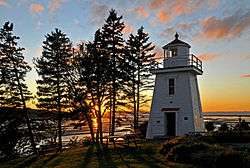Walton, Nova Scotia
| Walton, Nova Scotia | |
|---|---|
| Village | |
|
Walton Harbour Lighthouse | |
 Walton, Nova Scotia Location within Nova Scotia | |
| Coordinates: 45°13′47″N 64°0′23″W / 45.22972°N 64.00639°WCoordinates: 45°13′47″N 64°0′23″W / 45.22972°N 64.00639°W | |
| Country |
|
| Province |
|
| Municipality | Hants County |
| Time zone | AST (UTC-4) |
| Postal code | B |
| Area code(s) | 902 |
| Part of a series about Places in Nova Scotia | |
Walton is a community in the Canadian province of Nova Scotia, located in the Municipal District of East Hants, Nova Scotia.[1] The community is named after James Walton Nutting.[2]

Acadians lived in the village before the Expulsion of the Acadians. At that time the community was named Petit Rivier. The Acadians built dykes and four dwellings.[3]
Later settled by New England Planters and Loyalists, Walton became a shipbuilding centre in the 19th century. Among the large vessels built was the namesake barque Walton built in 1855. Many of the ships built in Walton were used to carry gypsum and later barite which was mined locally (see below).[4]
A Walton lighthouse was built in 1873 and still marks its presence along the coastline. The Walton Lighthouse aided ships into the port of Walton for many years until the shipping industry declined in the 1970s and now the lighthouse is a heritage landmark of Nova Scotia.
The original barite wharf in Walton was burned down by arson on August 9, 2012.
Walton barite mine
Located about 4 km southwest of Walton, Nova Scotia, the Walton barite mine (1941-1978) is one of the world's largest barite deposits. The mine is Canada's largest barite mine, and accounted for 90% of Canadian barite production in the 1960s. In addition to barite, the mine also contains deposits of lead, zinc, silver, and copper.[5][6]
History
A small barite outcrop has been known since at least 1894. The outcrop was rediscovered in 1940 by Roscoe Hiltz, who brought it to the attention of Springer Sturgeon Gold Mines Ltd. The importance of the deposit was quickly realized, and the mine started producing barite in 1941. Production was initially operated by Canadian Industrial Minerals, a subsidiary of Springer Sturgeon, then leased to Magnet Cove Barium Corporation in 1955. While conducting a diamond drilling program, the Nova Scotia Department of Mines revealed a lead-zinc-silver-copper ore body beneath the large barite deposit.[5]
In 1970, flooding was caused by a blast in one of the large fault zones. The flood water became brackish after a few months and in 1976 the mine began phase-out operations. Production ended in February 1978, leaving nearly one million tons of material underground. The mine produced over 4.3 million tonnes of barite during its 30 year life.[5]
Geology
The region around the deposit is marked by two major sets of faults, oriented east-west and northwest-southeast.[5]
Fire Department
A small local volunteer fire department is located in Walton, going by the name of Walton Shore Volunteer Fire Department. The fire department has hosted a "Field Day" every summer, usually at the end of July, consisting of games and a parade. Being one of very few, the fire department operates in both West and East Hants; doubling the area of service.
Further reading
- Walton's Link to the White House., by G. A. O’Reilly
References
- ↑ Dictionary of Canadian Biography)
- ↑ Place-Names and Places of Nova Scotia, NS Archives. p. 708
- ↑ Scott, S. and Scott, T. (2008). Noel Doiron and the East Hants Acadians. Nova Scotia Historical Society: The Journal.
- ↑ Gypsum in Canada - Walton Quarry.
- 1 2 3 4 Nova Scotian Mineral Localities.
- ↑ Photos of the mine vicinity.
